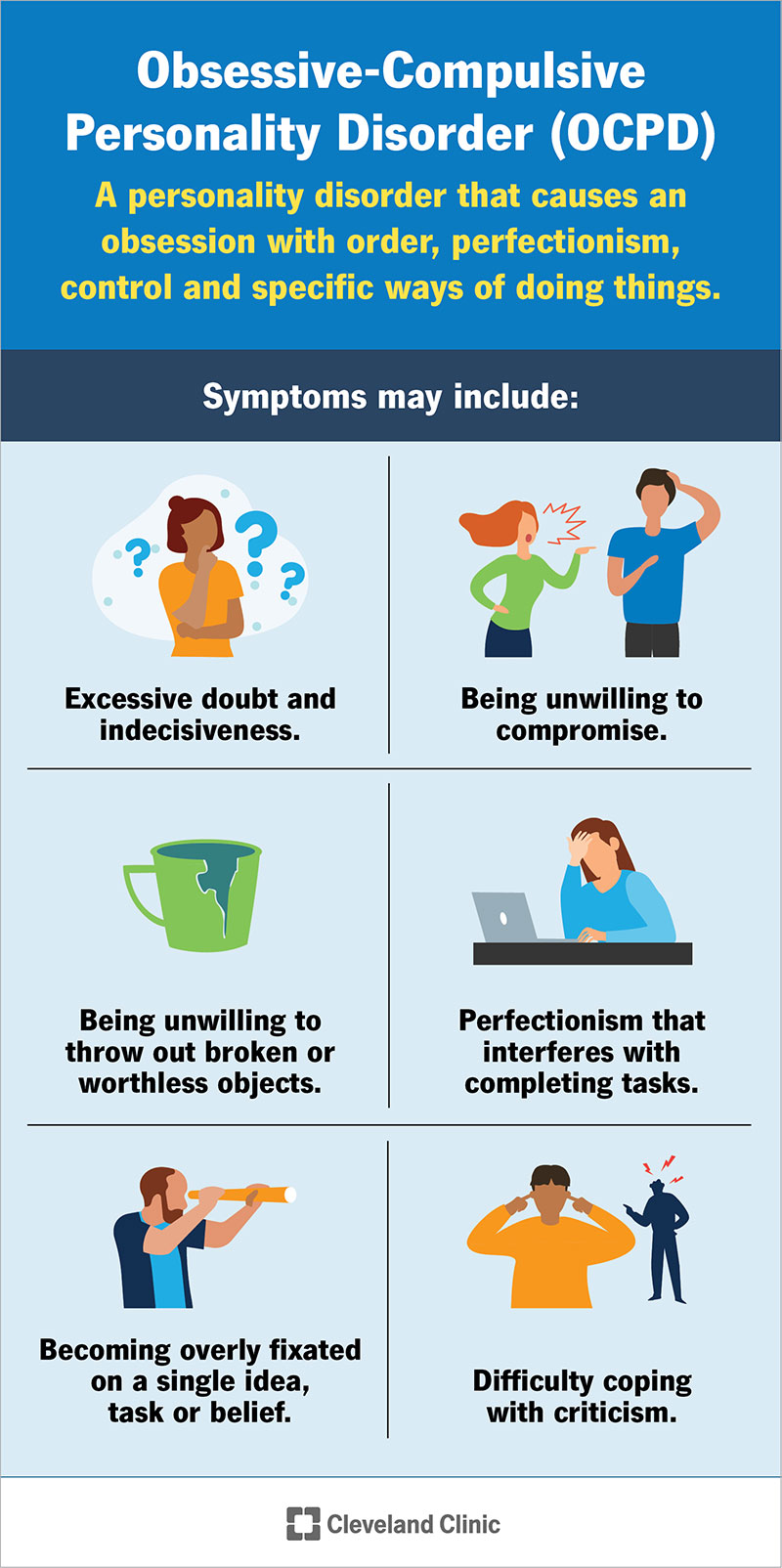Obsessive-compulsive personality disorder (OCPD) involves an extensive preoccupation with perfectionism, organization and control. People with OCPD have rigid beliefs and need to have control of themselves, others and situations.
Advertisement
Cleveland Clinic is a non-profit academic medical center. Advertising on our site helps support our mission. We do not endorse non-Cleveland Clinic products or services. Policy

Image content: This image is available to view online.
View image online (https://my.clevelandclinic.org/-/scassets/images/org/health/articles/24526-obsessive-compulsive-personality-disorder)
Obsessive-compulsive personality disorder (OCPD) is a mental health condition that causes an extensive preoccupation with perfectionism, organization and control. These behaviors and thought patterns interfere with completing tasks and maintaining relationships.
Advertisement
Cleveland Clinic is a non-profit academic medical center. Advertising on our site helps support our mission. We do not endorse non-Cleveland Clinic products or services. Policy
People with OCPD have rigid beliefs and specific ways of doing different tasks. They don’t allow for any flexibility and are unable to compromise with others. People with OCPD often don’t realize their behavior and way of thinking are problematic.
OCPD is one of a group of conditions called “Cluster C” personality disorders, which involve anxiety and fear.
Even though they sound similar, obsessive-compulsive personality disorder (OCPD) and obsessive-compulsive disorder (OCD) are different conditions.
OCD is an anxiety disorder in which you have frequent unwanted and intrusive thoughts (obsessions) that cause you to perform repetitive behaviors (compulsions). Examples of compulsions include flipping a light switch a certain number of times or repeatedly washing your hands.
People with OCD usually are aware that the condition is causing their behavior and accept that they need professional help to treat it. People with OCPD usually have little, if any, self-awareness of their behaviors.
Obsessive-compulsive personality disorder usually begins in your late teens or early 20s. It’s more common in adults whose highest education level is high school graduation or less.
OCPD is also more likely to affect people with the following mental health conditions:
Advertisement
Studies suggest that OCPD is the most common personality disorder in the general population in the United States. It affects 3% to 8% of adults.
The main sign of obsessive-compulsive personality disorder is a pervasive preoccupation (obsession) with order, perfectionism, control and specific ways of doing things. These behaviors make it difficult to complete tasks and cause issues with relationships.
Symptoms of OCPD usually begin by early adulthood.
A person with obsessive-compulsive personality disorder (OCPD) may:
At a glance, people with OCPD usually appear confident, organized and high-achieving. Their exacting standards may even benefit them in certain jobs. However, their inability to compromise or change their behaviors usually negatively affects their relationships.
Personality disorders, including obsessive-compulsive personality disorder, are among the least understood mental health conditions.
Researchers are still trying to figure out the exact cause of them, but they think personality disorders develop due to several factors, including:
OCPD can be difficult to diagnose, as most people with a personality disorder don’t think there’s a problem with their behavior or way of thinking.
When they do seek help, it’s often because of anxiety or depression due to the problems created by their personality disorder, such as losing their job or relationships, not the disorder itself.
Advertisement
When a mental health professional, such as a psychologist or psychiatrist, suspects someone might have obsessive-compulsive personality disorder, they often ask broad, general questions that won’t create a hostile, defensive environment. They ask questions that shed light on:
Because a person suspected of having OCPD may lack insight into their behaviors, mental health professionals often work with the person’s family and friends to collect more information about their behaviors and history.
Mental health providers base a diagnosis of OCPD on the criteria for the condition in the American Psychiatric Association’s Diagnostic and Statistical Manual of Mental Disorders.
For a diagnosis of OCPD, the person must have a persistent pattern of preoccupation with:
This pattern is portrayed by four or more of the behaviors listed in the symptoms section.
In most cases, people with obsessive-compulsive personality disorder (OCPD) don’t believe their behaviors are problematic. However, they might seek help if another issue causes them distress.
Psychotherapy (talk therapy) is usually the treatment of choice for personality disorders. The goal of treatment is to help the person uncover the motivations and fears associated with their thoughts and behavior. In addition, they can learn to relate to others more positively.
Advertisement
Two specific types of psychotherapy that can help people with OCPD include:
While there’s currently no medication that can treat personality disorders, there’s medication for depression and anxiety, which people with OCPD may also have. Treating these conditions can make it easier to treat OCPD.
The prognosis (outlook) for OCPD depends on if it’s treated or not.
Left untreated, OCPD may result in:
Advertisement
While you can’t prevent OCPD, many of the related problems might be lessened with treatment. Seeking help as soon as symptoms appear can help decrease the disruption to the person’s life, family and friendships.
It’s important to remember that obsessive-compulsive personality disorder (OCPD) is a mental health condition. As with all mental health conditions, seeking help as soon as symptoms appear can help decrease the disruptions to your life. Mental health professionals can offer treatment plans that can help you manage your thoughts and behaviors.
The loved ones of people with OCPD often experience stress, depression and isolation. It’s important to take care of your mental health and seek help if you’re experiencing these symptoms.

Sign up for our Health Essentials emails for expert guidance on nutrition, fitness, sleep, skin care and more.
Learn more about the Health Library and our editorial process.
Cleveland Clinic's health articles are based on evidence-backed information and review by medical professionals to ensure accuracy, reliability, and up-to-date clinical standards.
Cleveland Clinic's health articles are based on evidence-backed information and review by medical professionals to ensure accuracy, reliability, and up-to-date clinical standards.
Your mental well-being is just as important as your physical well-being. Cleveland Clinic’s mental health experts can help you live life to the fullest.
